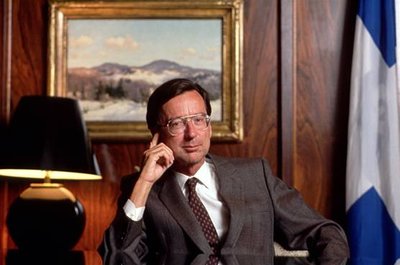Robert Bourassa
|
|
Robert Bourassa (July 14, 1933–October 2, 1996) was a politician in Quebec, Canada. Born in Montreal, he served as Liberal Premier of Quebec from May 12, 1970 to November 25, 1976. He served as premier again from December 12, 1985 to January 11, 1994).
| Contents |
Profile
Robert Bourassa graduated from the Université de Montréal law school in 1956 and was admitted to the Barreau du Québec the following year. Later, he studied at the University of Oxford, obtaining a degree in political economy and at the Harvard University. As Premier of the Province of Quebec, he played a critical role in the October Crisis of 1970 in which his labour minister Pierre Laporte was murdered. It was Bourassa who pushed the Prime Minister of Canada, Pierre Trudeau, to declare a state of emergency, which resulted in the Canadian army patrolling the streets of major cities in Quebec and in the national capital, Ottawa. After Laporte's kidnapping, Bourassa barricaded himself and his cabinet behind heavy layers of security.
Bourassa and Trudeau often clashed over issues of federal-provincial relations and Quebec nationalism with Trudeau opposing what he saw as concessions to separatism. Trudeau also looked down on Bourassa personally, once referring to him as a mangeur d'hot dog (a hot dog eater).
Bourassa lost the 1976 Quebec election to René Lévesque, leader of the separatist Parti Québécois. He resigned as Liberal Party leader, and accepted teaching positions in Europe and the United States. He subsequently returned to politics as Liberal leader on October 15, 1983, and regained the office of premier in 1985.
During his time in power, he implemented policies aimed at protecting the status of the French language in Quebec. In 1974, he introduced Bill 22, the first legislation designed to strengthen the position of French within Quebec. However, this legislation was soon superseded by the Charter of the French Language also known as Bill 101, introduced by the Parti Québécois government that replaced him in 1976.
In his second term, he invoked the notwithstanding clause of the Canadian Charter of Rights and Freedoms to override a Supreme Court ruling that declared parts of the Charter of the French Language unconstitutional, causing some English-speaking ministers in his government to resign. A few years later, however, he introduced modifications to the language charter. These compromises reduced the controversy over language that had been a dominant feature of Quebec politics over the previous decades. The majority of Quebecers reached a consensus on accepting the new status quo.
Bourassa also pushed for Quebec to be acknowledged in the Canadian constitution as a "distinct society", promising Quebecers that their grievances could be resolved within Canada with a new constitutional deal.
Early in his first term, he participated in an early attempt at constitutional reform, the Victoria Charter of 1971, which quickly unravelled. In his second term, he worked closely with federal Prime Minister Brian Mulroney and received many concessions from the federal government, culminating in the Meech Lake Accord and the Charlottetown Accord. When both of these accords failed to be ratified, the constitutional reform efforts collapsed, reviving the separatist movement.
Bourassa initiated the James Bay hydroelectric projects, but ran into opposition from environmentalists and the Cree who lived on the land in question. The Bourassa government also played a major role in rescuing the 1976 Olympic Games in Montreal from the huge cost overruns and construction delays incurred by the mismanagement of the project by mayor Drapeau's administration.
Bourassa retired from politics in 1994 in poor health and having lost the popularity that had returned him to the premier's office. He was replaced as Liberal leader and premier by Daniel Johnson, Jr., who lost an election to the separatist Parti Québécois after only nine months.
In 1996, he died in Montreal of skin cancer and was interred at the Cimetière Notre-Dame-des-Neiges in Montreal, Quebec.
Quotations
- No matter what anyone says and no matter what anyone does, Quebec is, today and forever, a distinct society, free and capable of assuming its destiny and development. (listen) (watch excerpts of original speech (http://archives.radio-canada.ca/IDCC-0-17-1176-6446/politique_economie/accord_meech/)) (watch English dubbing (http://archives.cbc.ca/IDC-1-73-1180-6498/politics_economy/meech_lake/clip10)) Speech given on June 22, 1990, at the National Assembly, in the wake of the Meech Lake Accord's demise.
Elections as party leader
He won the 1970 election and the 1973 election, lost the 1976 election, retired and returned, won the 1985 election and 1989 election, and resigned in 1994.
See also
- Robert Bourassa's speech on the end of the Meech Lake Accord
- Politics of Quebec
- List of Quebec Prime Ministers
- List of Quebec general elections
- Timeline of Quebec history
- Prime Minister nicknaming in Quebec
- Les Boubou Macoutes
External links
- National Assembly biography (http://www.assnat.qc.ca/fra/membres/notices/b/bourr.htm) (in French)
| Preceded by: Jean-Jacques Bertrand | Premier of Quebec 1970-1976 | Succeeded by: René Lévesque |
| Preceded by: Pierre-Marc Johnson | Premier of Quebec 1985-1994 | Succeeded by: Daniel Johnson, Jr |
| Preceded by: Jean Lesage | Leader of the Quebec Liberal Party 1970-1976 | Succeeded by: Gérard D. Lévesque |
| Preceded by: Gérard D. Lévesque | Leader of the Quebec Liberal Party 1983-1994 | Succeeded by: Daniel Johnson, Jr. |

